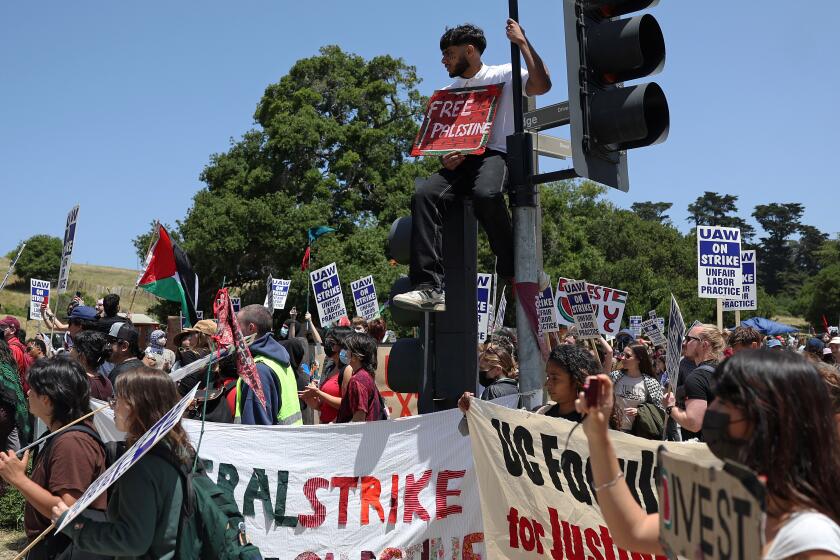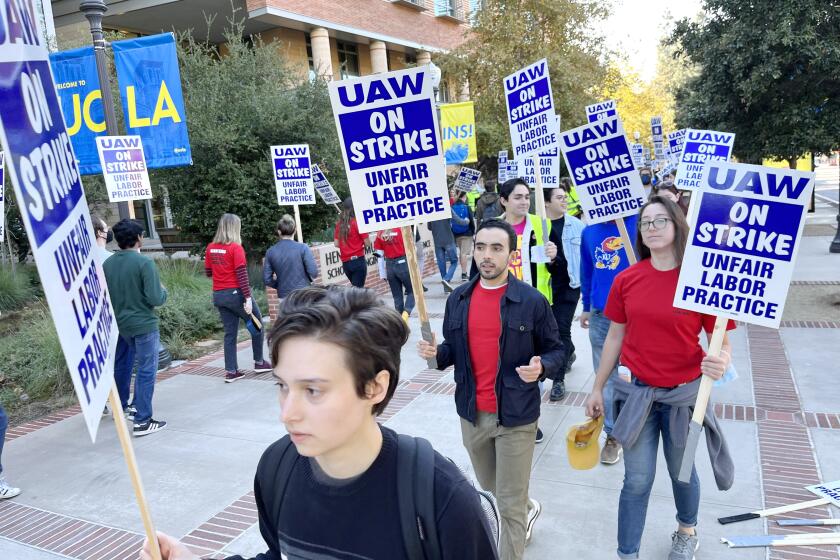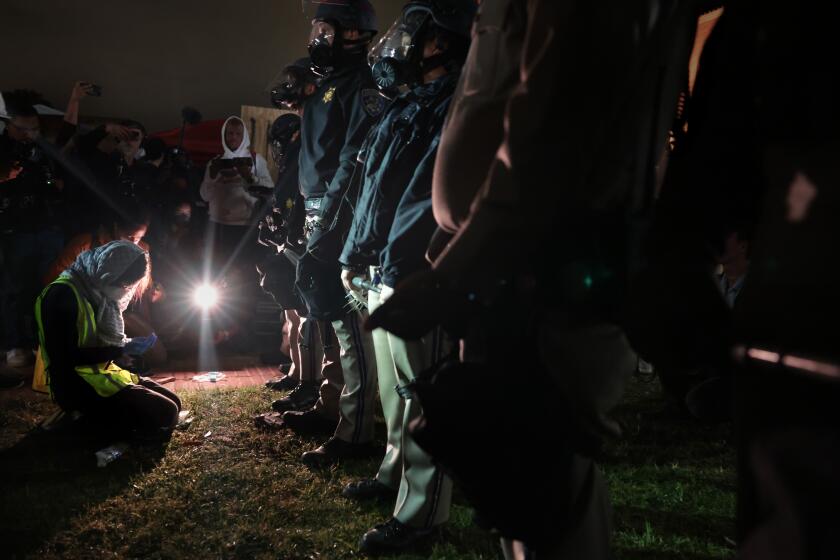UC seeks injunction to halt strike as academic workers threaten to expand walkouts
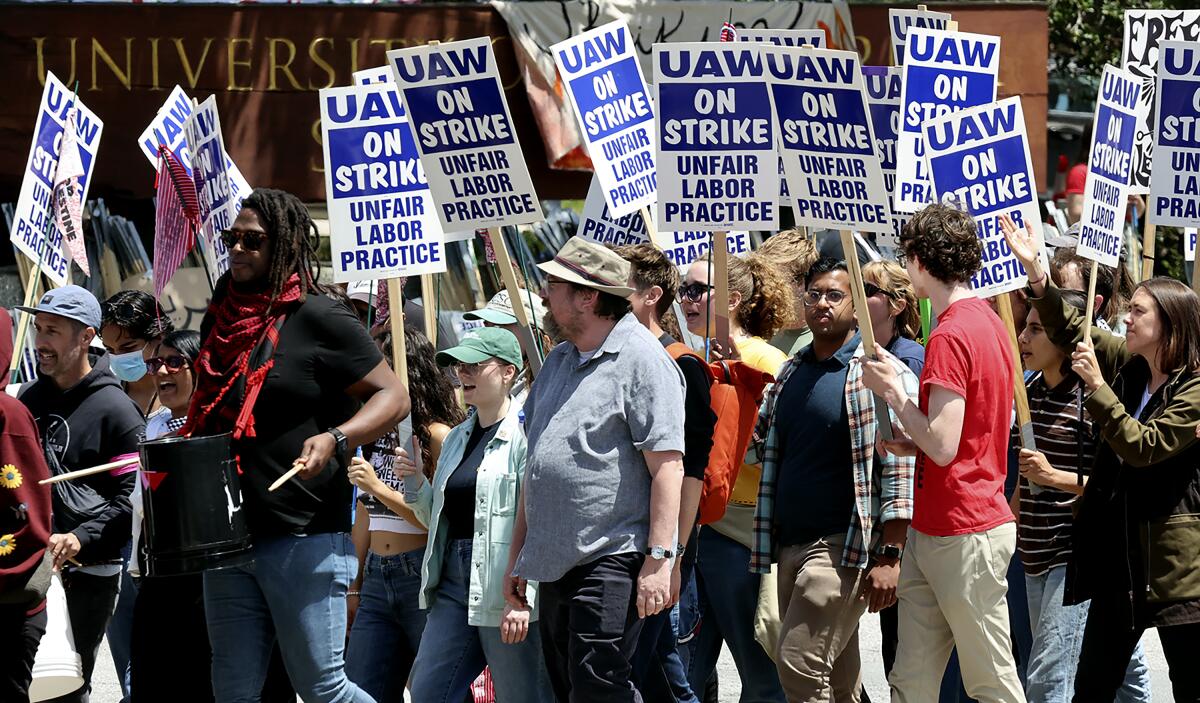
University of California officials are seeking a court order to end immediately a strike by academic workers that is underway at UC Santa Cruz and could spread to others campuses in the system.
The request for injunctive relief was filed Tuesday afternoon with the California Public Employment Relations Board, which oversees labor-management interaction for public employees in the state.
The 2-day-old strike was launched by United Auto Workers 4811, which represents 48,000 graduate student teaching assistants, tutors, researchers and other academic workers at the 10 UC campuses and Lawrence Berkeley National Laboratory.
“Allowing the strike to continue will cause the University and its students irreparable harm — UAW members play a critical role in year-end activities like teaching, grading, and ongoing time-sensitive research,” a university statement released Tuesday said.
The academic workers contend that their free speech rights were violated when system leaders called on police to forcibly remove pro-Palestinian encampments at several campuses and activists at UCLA were not protected from a mob attack for hours. Police later moved in to dismantle the UCLA encampment, making about 200 arrests, including some members of the striking union.
Ever since the Israel-Hamas war began last year, student protesters from California to New York have called on schools to divest. But administrators say it is not so simple.
Demands of union leaders include the protection of free speech on campus, an amnesty for all academic employees, students, student groups, faculty and staff who face disciplinary action or arrest due to participation in protests, and divestment by the university from “weapons manufacturers, military contractors, and companies profiting from Israel’s war on Gaza.”
University officials assert that the strike is unlawful because the goal is “to pressure the University to concede to a list of politically motivated demands closely linked to the protests occurring across California and the nation.”
The request for injunctive relief “asks PERB to issue a court order to effectively end the strike,” said Heather Hansen, a spokesperson for the UC office of the president.
UC officials said that they support free speech but that union negotiations “must be tied to terms and conditions of employment and terms in the collective bargaining agreement.” The university also cited no-strikes provisions in the current contract.
Union President Rafael Jaime said the university’s latest action was disappointing but not surprising.
The union contends that the strike is legal under rules that permit walkouts in response to unfair labor practices. Each side has submitted charges with PERB accusing the other of violating labor rules. The request for an injunction, however, will trigger an expedited process.
Academic workers walk out to support participants in the pro-Palestinian protests. UC officials call the strike illegal. It could spread to other campuses.
“UAW will be given an opportunity to file its opposition papers no later than tomorrow morning — likely before noon,” said J. Felix De La Torre, general counsel for the employment board, referring to a Wednesday deadline. “The Board will then deliberate and likely issue its decision by Thursday.”
The union on Tuesday accused the university of improperly refusing to negotiate.
“We are open to sitting down with UC to resolve these Unfair Labor Practices,” Jaime said. In addition to demanding an amnesty, the union is calling for talks “over the numerous workplace changes and policy changes the University made as part of its crackdown on political speech on campus.”
The union on Tuesday also called attention to disciplinary guidelines affirmed May 16 by the governing Board of Regents.
Under these rules, “any member of the university community who is arrested for unlawful behavior or cited for a violation of university policy must go through the applicable review process, such as student code of conduct or employee disciplinary process.”
The union characterized this step as an additional unfair labor practice, for which it would file a complaint Tuesday: “This new policy was not negotiated with the union. ... UC is taking the law into its own hands to crush freedom of speech on University campuses.”
The university in turn insisted that these rules are not new.
Unless UC takes a different course, the union warned, its leaders would announce an expansion of the strike to other campuses “no later than Friday.”
Some activists and union members have been calling for an immediate escalation.
“The real power of our strike lies in our ability to bring the university to a grinding stop — only by completely disrupting the university’s operations can we win,” one UCLA-based group posted on social media, calling for a sick-out on Wednesday and Thursday.
United Auto Workers Local 4811, which represents 48,000 student workers in the University of California system, authorized a strike alleging their workers’ rights were violated in actions against pro-Palestinian protests.
On Tuesday, hundreds of striking academic workers continued to walk picket lines at UC Santa Cruz joined by pro-Palestinian demonstrators who moved their encampment close by, relocating tents and sleeping bags to the university entrance along High Street.
The Santa Cruz job action, which had been announced Friday, is the first in a potential series of rolling strikes across the UC system.
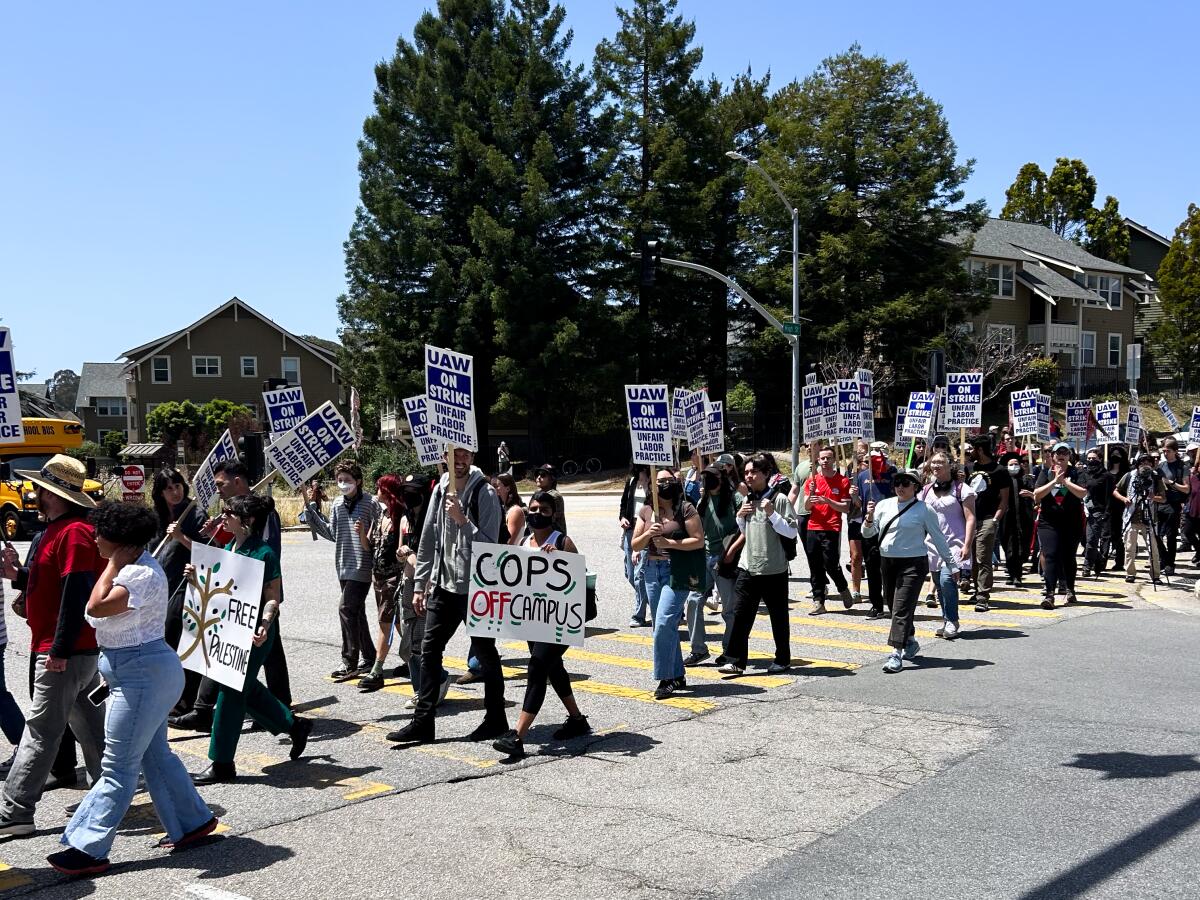
The strike comes as a wave of encampments sweeps across colleges and universities. Demonstrators have at times occupied college buildings while calling for an end to Israel’s military attacks in Gaza.
In California, some of those encampments have been cleared with a significant police presence. At UC Irvine, law enforcement agencies from across Orange County wearing riot gear dismantled a camp and arrested 47 protesters. Police also were called to take down encampments at UC San Diego, Cal Poly Humboldt and USC.
As pro-Palestinian protests grow at California colleges and universities, counterprotesters spark clashes at UCLA.
Demonstrators at UC Riverside and UC Berkeley reached agreements with university officials to take down the camps without police interaction.
Students at UC Davis have managed to keep their encampment up for nearly two weeks without any clashes with the university.
More to Read
Sign up for Essential California
The most important California stories and recommendations in your inbox every morning.
You may occasionally receive promotional content from the Los Angeles Times.

